 Petzlover
Petzlover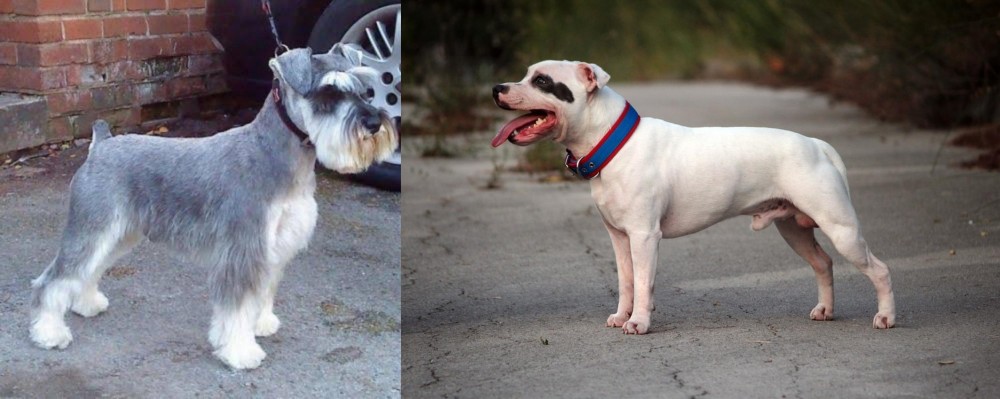 Miniature Schnauzer is originated from Germany but Staffordshire Bull Terrier is originated from United Kingdom. Both Miniature Schnauzer and Staffordshire Bull Terrier are having almost same height. Miniature Schnauzer may weigh 7 kg / 15 pounds lesser than Staffordshire Bull Terrier. Both Miniature Schnauzer and Staffordshire Bull Terrier has same life span. Both Miniature Schnauzer and Staffordshire Bull Terrier has almost same litter size. Miniature Schnauzer requires Moderate Maintenance. But Staffordshire Bull Terrier requires Low Maintenance
Miniature Schnauzer is originated from Germany but Staffordshire Bull Terrier is originated from United Kingdom. Both Miniature Schnauzer and Staffordshire Bull Terrier are having almost same height. Miniature Schnauzer may weigh 7 kg / 15 pounds lesser than Staffordshire Bull Terrier. Both Miniature Schnauzer and Staffordshire Bull Terrier has same life span. Both Miniature Schnauzer and Staffordshire Bull Terrier has almost same litter size. Miniature Schnauzer requires Moderate Maintenance. But Staffordshire Bull Terrier requires Low Maintenance
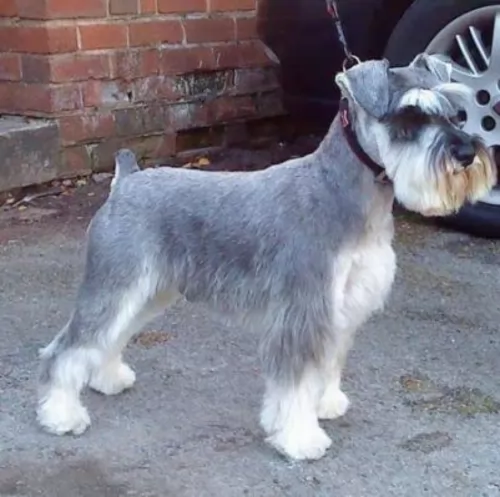 Miniature Schnauzers were first bred in Germany in the 19th century being bred from Affenpinschers and Standard Schnauzers.
Miniature Schnauzers were first bred in Germany in the 19th century being bred from Affenpinschers and Standard Schnauzers.
This dog was always used to control rats on farms, but these days he is more a companion. It is believed that the start of the modern Miniature Schnauzer in the United States was around 1924 when dogs were imported from Germany.
It was in 1933 that the Miniature Schnauzer was recognized by the AKC as a separate breed from the Standard Schnauzer.
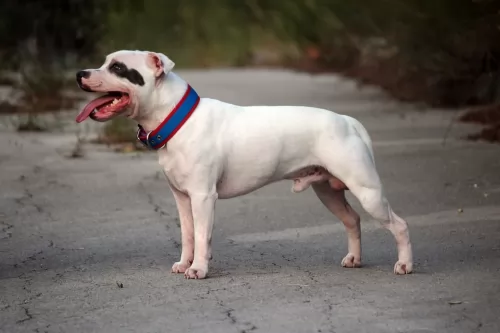 The Staffordshire Bull Terrier was first developed in the northern sections of Birmingham and in Staffordshire, England. The Staffie is a cross between a Black and Tan Terrie and the Bulldog, but had other breeds crossed in over time in order to create a bull-baiting dog and a fighting dog. In the Victorian age these sports were banned but dog fighting went underground and continues on some level today.
The Staffordshire Bull Terrier was first developed in the northern sections of Birmingham and in Staffordshire, England. The Staffie is a cross between a Black and Tan Terrie and the Bulldog, but had other breeds crossed in over time in order to create a bull-baiting dog and a fighting dog. In the Victorian age these sports were banned but dog fighting went underground and continues on some level today.
The Staffordshire Bull Terrier was exceptional at these “sports” due to his build, power and jaw strength. Today’s Staffie is a descendent of those early Bull Terrier crosses. Together with the Bull Terrier and the American Pit Bull, the Staffie also traces its roots back to those original English Bully dogs. All three breeds have the Bulldog in common.
After dog fighting and bull baiting were banned the Stafforshire Bull Terrier was further developed as a companion and pet. Still their reputation as fighting dogs cost them recognition in the official kennel clubs for some time. They finally made the UK registry in 1935, but it was not until 1974 that the American Kennel Club (AKC) accepted them.
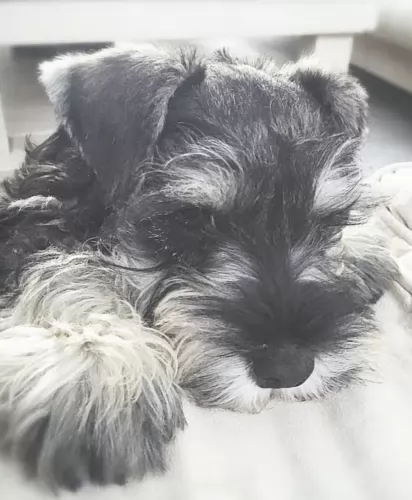 The Miniature Schnauzer is a small dog breed that stands between 30 to 36cm in height and weighs between 5 and 10kg.
The Miniature Schnauzer is a small dog breed that stands between 30 to 36cm in height and weighs between 5 and 10kg.
He has a sturdy body with a dense, wiry coat which most people prefer to have stripped. Because stripping is quite tedious, many of these dog owners prefer to have the coat clipped which actually gives the coat a greyish look to it.
The coat is usually a mix of black and silver. Some people refer to the Miniature Schnauzer as having a salt-and-pepper coat – hairs that are a mix of black and white. The dog has a double coat with the outer coat being wiry and the undercoat being a lot softer.
This is a dog that will need to be groomed frequently to prevent matting. A noticeable feature with these dogs is the rectangular shaped head with alert slanted eyes and bushy eyebrows, mustache and beard. In fact the word ‘Schnauzer’ means beard or muzzle.
The ears have been traditionally cropped but these days they are left and then they tend to be half-erect, half-floppy.
This is a tough little dog, fearless, cheeky, arrogant, alert and also friendly. A draw-card with him is that he is considered as a low-shedder and being hypoallergenic.
They’re very intelligent dogs too and will learn quickly when you give him training and socialization. This is important for a dog like this as he can quickly show you that he is strong willed and independent. Training and socialization makes him much nicer as he becomes more balanced and obedient.
He is full of life and extroverted and you can count on him to join you wherever you are and whatever you’re doing. Whether watching TV, swimming or hiking, he’ll be there and turn every occasion into a festive event. He is a loving, loyal dog, making a splendid pet.
He's protective of his human family and tends to be suspicious of strangers, and this is what makes him such a great watchdog.
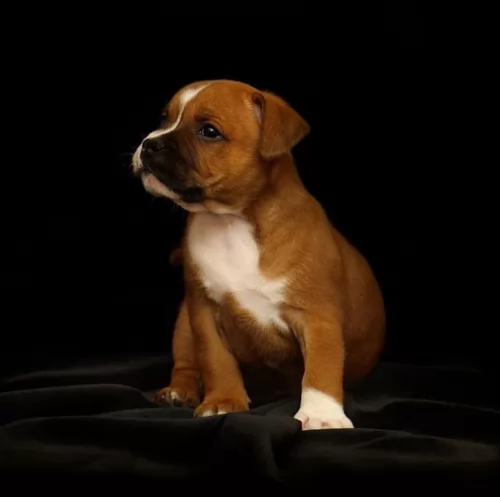 The Staffordshire is a muscular, stocky and unusually strong breed, small to medium size in height and build. They have broad, powerful chests, wide set, strong legs, strong shoulders, broad head with a fairly short muzzle. Their ears are not cropped but they are short and fold over. The coat is stiff, close and short and the tail is medium and carried low. Most Staffies are brown, but they can be red, brindle with white, fawn, black, white or blue.
The Staffordshire is a muscular, stocky and unusually strong breed, small to medium size in height and build. They have broad, powerful chests, wide set, strong legs, strong shoulders, broad head with a fairly short muzzle. Their ears are not cropped but they are short and fold over. The coat is stiff, close and short and the tail is medium and carried low. Most Staffies are brown, but they can be red, brindle with white, fawn, black, white or blue.
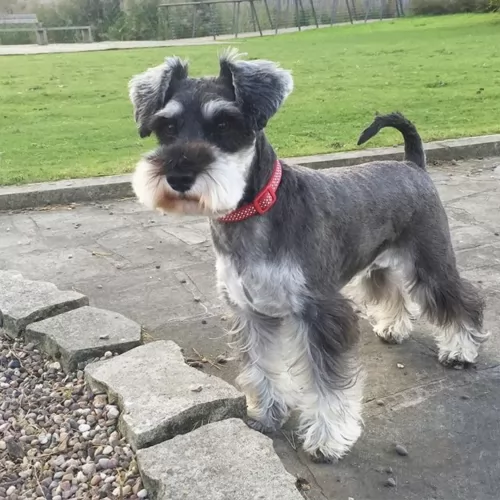 Miniature Schnauzers are such adaptable little dogs, quite happy to make a home with you in the city or in the countryside.
Miniature Schnauzers are such adaptable little dogs, quite happy to make a home with you in the city or in the countryside.
They’re sociable dogs, so just being with his human family wherever they are will suit him well. If he lives in the city however, he will need to have a walk everyday or taken to the park for a run.
He is also a dog that scarcely sheds, so he suits people battling with allergies. With an average life expectancy of 12 to 14 years, if you nurture your Mini Schnauzer and give him the best food and exercise there is, as well as loving him, you’re going to have a loyal and devoted pet.
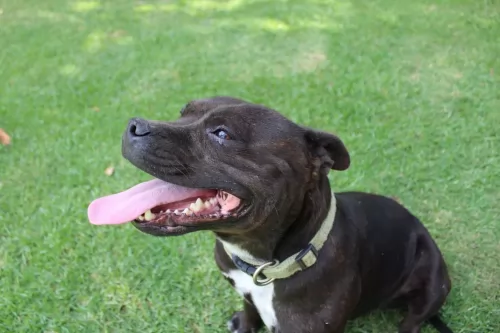 1.Children friendliness The breed adores children but care should still be taken because they are so strong and their jaws are so powerful.
1.Children friendliness The breed adores children but care should still be taken because they are so strong and their jaws are so powerful.
2.Special talents they adore children and they one of the most powerful jaws among canines.
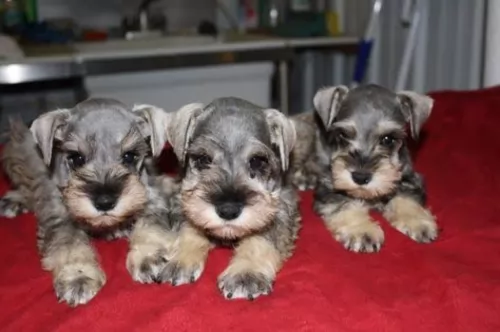 Your Miniature Schnauzer is pretty healthy and he isn’t likely to cost you much in terms of vet fees. There are however some common dog problems that you want to be aware of such as cataracts of the eye and hypothyroidism.
Your Miniature Schnauzer is pretty healthy and he isn’t likely to cost you much in terms of vet fees. There are however some common dog problems that you want to be aware of such as cataracts of the eye and hypothyroidism.
This a a problem in the lens of the eye. The lens should be clear, and when a dog has a cataract, it obscures the vision. The size of the cataract can lead to blindness.
Diabetes in a dog can bring on cataracts as can genetics or damage to the eye from exposure to ultraviolet light. Fortunately, dogs with cataracts can still see. Dogs with old cataracts can have surgery to remove them.
When a dog owner suspects a cataract in their pet’s eye it is best to treat it immediately with anti-inflammatory dog cataract eye drops. Cataracts never go away however without surgery.
The thyroid gland in the neck produces a hormone called thyroxine. It controls metabolism, but with hypothyroidism, enough of the hormone isn’t made. Its a common disease which affects all dog breeds.
Signs of hypothyroidism include hair loss, weight gain, intolerance to cold and a troublesome skin. To have the disease diagnosed, the vet will do a series of blood tests.
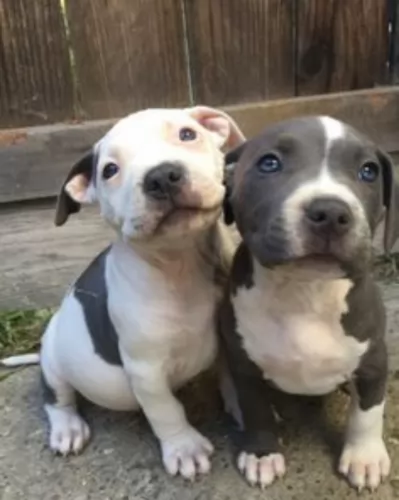 • Patella luxation otherwise known as a slipped kneecap- can cause pain and some lameness.
• Patella luxation otherwise known as a slipped kneecap- can cause pain and some lameness.
• Skin allergies and even a tendency toward Mange which is chronic in some forms and fatal in others.
• Like most active dogs their size, they are susceptible to bloat which can be fatal if not treated immediately.
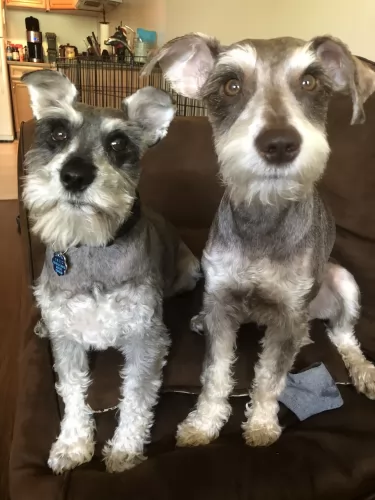 Let’s look at several ways you need to care for your Miniature Schnauzer -
Let’s look at several ways you need to care for your Miniature Schnauzer -
Make sure you have his puppy injections on time. This means knowing which veterinarian you’ll use. Later on if you don’t want to go in for breeding, you will need to have your pet spayed or neutered.
Make sure you have a nice warm, dry spot for your dog to sleep. It can be a cardboard box, or you can buy a dog basket or sleeping platform. Make sure your pet loves it and knows he can retreat to it anytime he wants.
If he goes outside for a few hours, make sure that he has a place to lie in the shade and away from the elements.
Good food promotes good health and longevity. You can feed your pet one of the top quality commercially manufactured foods and give your pet some variety by adding in some boiled chicken, vegetables and brown rice. Some raw meat occasionally can also be excellent for your pet.
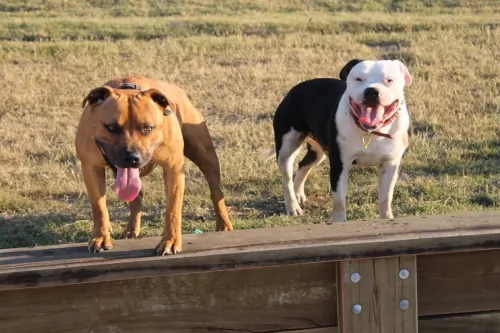 1.Feeding the puppy Don’t over feed as he grows fast. Feed a high quality dog food for medium size puppies. Feed 1-2 and a quarter cups in 3-4 meals per day.
1.Feeding the puppy Don’t over feed as he grows fast. Feed a high quality dog food for medium size puppies. Feed 1-2 and a quarter cups in 3-4 meals per day.
2.Feeding the adult Don’t exercise right before or after eating due to potential for bloat. Feed 1-2 times a day a high quality medium breed dog food.
4. Games and Exercises They are terriers after all and they dig. Need a fairly large yard with a strong fence. They love to play ball, frisbee and can excel at cart pulling.